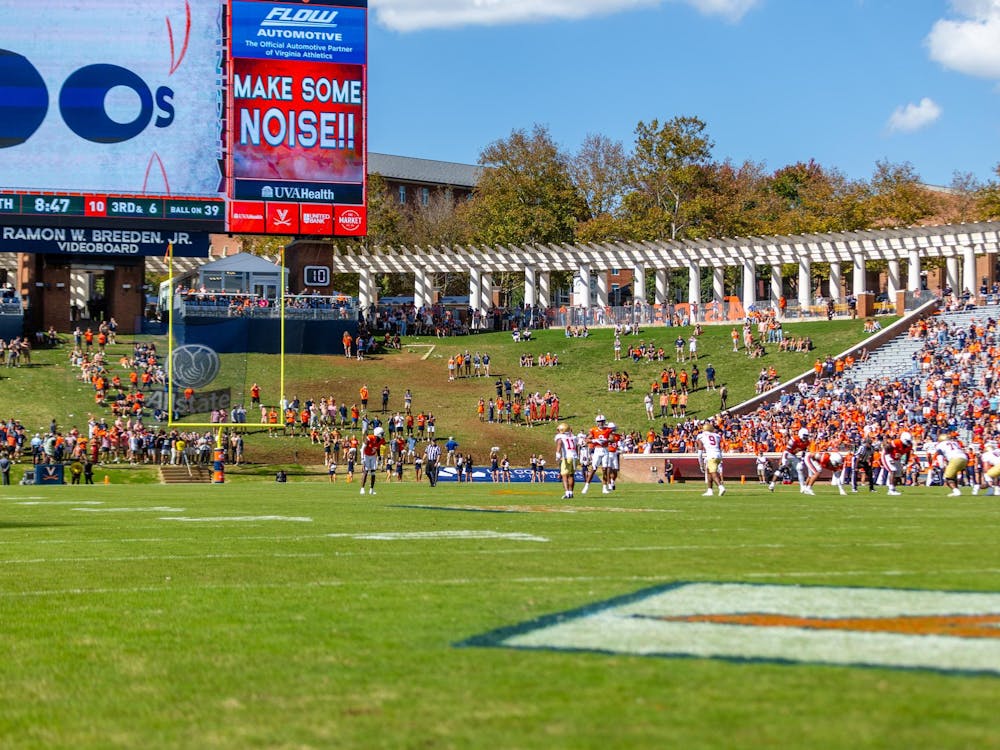The Virginia Athletic Department has declared two athletes who are also Jefferson Scholars ineligible because the scholarships are considered impermissible financial aid under NCAA regulations.
According to Lynn Mitchell, the University's associate athletic director for compliance, the University athletic department ruled that the two students - third-year wrestler Jason Bernd and third-year rower Jennifer Blomberg - were ineligible after becoming aware of possible NCAA violations in late January.
"I told the two coaches that the students were ineligible" from competing and practicing with the team, Mitchell said. "The coaches communicated that to the students."
Bernd was declared ineligible from competing at the ACC wrestling championships. Blomberg is not competing with the crew team.
Mitchell also told James H. Wright, executive director of the Jefferson Scholars Foundation, about the situation at the same time to allow the Foundation the opportunity to look into solutions for the problem.
|
According to Mitchell, the NCAA considers the Jefferson Scholarship impermissible aid because it is not institutional aid. It would be classified as institutional aid if the list of recipients was approved by the Office of Financial Aid.
Each year the Jefferson Scholars Foundation awards 25 students scholarships that are funded by private donations and distributed by the Foundation, which works with the Alumni Association. The Jefferson Scholars Foundation chooses recipients without input from the Office of Financial Aid or other University departments.
"To become institutional aid, the Jefferson Scholar board would have to agree to recommend students and submit the names to the financial aid office," Mitchell said. "The financial aid office would then approve the list of students and allow the Jefferson Scholars Foundation to distribute the scholarships."
Wright said the Jefferson Scholars Foundation is working on reaching a solution to the situation. He said the Foundation tried to work out an agreement with the NCAA when it first became aware of the problem, but the NCAA rejected that proposal.
"Our board meets in mid-April," Wright said. "It's obviously one of the things that we are going to try to try to wrestle with. We'll reach a resolution on our position after that meeting and tell the athletic department who will communicate our decision to the NCAA."
Blomberg said the Foundation will meet on April 14.
Mitchell said if the Jefferson Scholars Foundation agrees to become institutional aid, it would not take very long to resolve the conflict.
"The NCAA has on record that we made the two students ineligible," Mitchell said. "All that I would have to do is provide them with paperwork showing that the scholarship is institutional and it would not be very complicated to reinstate the students."
The amount of funding that each student receives as part of the Jefferson Scholarships presents an additional problem. Each scholarship covers the full cost of education at the University, including tuition, fees, books, room and board and miscellaneous expenses. The NCAA allows recruited student-athletes to receive tuition, fees, books and room and board but not miscellaneous expenses. In situations where athletes receive more money, the NCAA usually requires the athlete to repay the excess amount.
Mitchell said recruited athletes would be required to pay back more of the excess than non-recruited athletes. While Bernd was recruited as a wrestler, Blomberg was a walk-on and is therefore not subject to the same restrictions.
"Jimmy Wright told me that I would have to pay back $220," Blomberg said.
But if the Jefferson Scholars Foundation decided that it was not going to make its scholarships institutional aid by letting the Office of Financial Aid approve their scholars, Blomberg and Bernd most likely would have to repay the full value of their Jefferson Scholarships.
"If they did not institutionalize, the Jefferson Scholarships would not be permissible aid," Mitchell said. "The NCAA usually requires that for a student to be reinstated, they repay the entire amount that is impermissible."
Blomberg and Bernd have both expressed frustration about their situation.
"The NCAA is creating the problem," Bernd said. "They create the rules and sometimes common sense and reason don't come into play."
Mitchell said she understands Blomberg and Bernd's aggravation.
"The students probably don't keep up with the NCAA rules and regulations," she said. "I would be frustrated too. It has nothing to do with athletics and everything to do with academics. The NCAA says that they want to have scholar-athletes but is now essentially asking them to choose."
But Mitchell also said the NCAA has rules such as these in place because of the great number of schools that it has to regulate.
"There was a school several years ago that came up with a scholarship called the Dairy Farmer Award," Mitchell said. "At that school, there were over 100 guys on the football team who were receiving full scholarships due to the Dairy Farmer Award. The NCAA saw that this school was getting around the rules and created the rule that all aid must be institutional."
The Athletic Department became aware of the possibility of a problem after reviewing a similar situation that had occurred at the University of North Carolina with the Morehead Scholarship. Like Jefferson Scholars, Morehead Scholars receive a grant that covers the full cost of their undergraduate education.
"We had about 15 students that were also participating in varsity athletics," said Chuck Lovelace, executive director of the Morehead Foundation. "We agreed to become institutional aid to solve the problem. For us, it was a philosophical decision. We didn't want our students to lose any privileges and we decided not to take any of them away from our students."
(Sports Editor Sam Le contributed to this report.)




